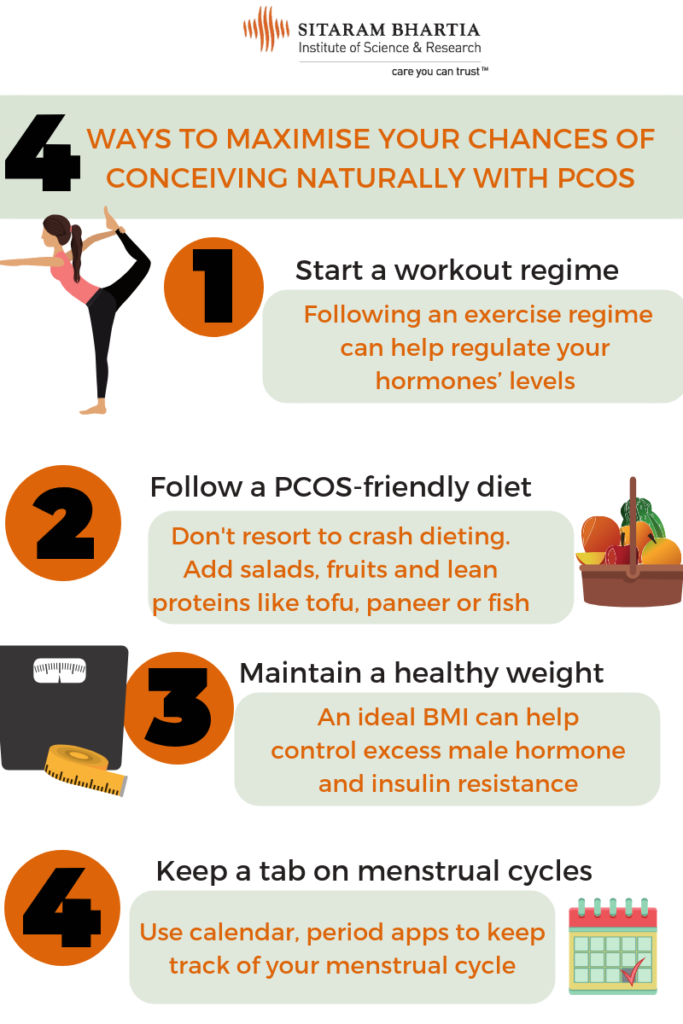PCOS and pregnancy isn’t as impossible as you may think.
Polycystic Ovary Syndrome (PCOS) is a condition in which the ovary is not able to release eggs regularly. This kind of erratic ovulation or absence of eggs (anovulation) may cause difficulties when women try to conceive.
Aakriti Sanghi, 31, was no different. She was planning a family with her husband, Pratap, and was worried that PCOS, obesity and age may come in the way.
After searching for the best gynecologist in Delhi online, she decided to consult Dr Priti A. Dhamija, Infertility specialist at Sitaram Bhartia Hospital to discuss PCOS and pregnancy.
She expressed her fears and asked her, “Can I get pregnant with PCOS naturally? Will I require an IVF?”
Dr Priti clarified, “There is a misconception that IVF is required for getting pregnant with PCOS especially after 30.”
“But in fact, many women are able to conceive naturally by making efforts to regulate their hormones.”
“Only a few women require IVF.”
Aakriti immediately leaned forward with renewed hope and asked how to get pregnant with PCOS quickly.
How to get pregnant with PCOS naturally?
Dr Priti emphasised, “It is essential to manage PCOS before trying to conceive. Your hormonal environment and ovulation should be brought back on track.”
You should keep these 4 points in mind when it comes to moving forward with PCOS and pregnancy:

- Start a workout regime:
The doctor emphasizes, “Besides a healthy diet, following an exercise regime is essential to reduce weight, regulate your hormones’ levels and to decrease stress.”
“Go for walks every day even if it’s for 30-45 minutes or take up light aerobic exercise, swimming or cycling as per your preference.”
After a few months, these changes should regulate your menstrual cycle and lead to ovulation.
- Follow a PCOS-friendly diet:
The doctor adds, “You should also stick to a healthy diet to help maintain your weight.”
“Don’t resort to crash dieting. Instead, add low carbs, low fat, protein-rich and fibre-rich foods to your plate. Your control on your diet should be evident as it will reflect on the result as well.”
“Eliminate junk foods and add whole grains, plenty of fibre like salads, fruits and lean proteins such as tofu, paneer or fish to your diet.”
Lifestyle modifications are the very foundation when it comes to managing PCOS. In some cases, other treatments may not have the desired results unless you change your way of life first.
Aakriti vowed to go back to her exercise regime to lose the excess weight and then enquired about any changes needed in her medications.
After changing Aakriti’s medications, she was also suggested to keep a tab on her menstrual cycles.
- Maintain a healthy weight
Dr Priti said, “If you are overweight, you should consider losing the excess weight.”
“The excess fat produces male hormone and the imbalance caused in the BMI (Body Mass Index) can lead to increased insulin resistance, which in turn affects the hormonal environment of the ovary and results in erratic or no ovulation at all.”
“Losing weight can be a slow process and therefore requires commitment, patience and persistence.”
You should have realistic expectations and focus on maintaining weight loss and build on your efforts to lose weight month by month.
“Be patient when it comes to weight management – this is a continuous journey which requires you to practice self-control as well as compassion with your own self.”
- Keep a tab on menstrual cycles:
For women with irregular menstrual cycles, it can be difficult to determine your ovulation and fertility windows.
Dr Priti explains to Aakriti,“For women with PCOS, keeping a tab of their ovulation cycle can be tough with the absence of menstruation and ovulation in most cases.”
“Once you have regular ovulation, either after lifestyle modifications or medical aid, then you are suggested to keep track of cycles on calendar, period apps to keep tab on your menstrual cycle.”
“After few months of lifestyle changes, if we don’t see the desired result, we can consider medical assistance like insulin sensitizers.”
Aakriti called her husband, Pratap as soon as she left the hospital and shared all that she learnt through the consultation.
To motivate Aakriti, he also promised to make the same lifestyle changes which made the whole transition much easier for her.
After months of diet control and regular exercise sessions with her husband, Aakriti was able to lose the excess weight. She, however, was unable to achieve regular ovulation.
How to get pregnant with pcos and irregular periods after making lifestyle changes?
Aakriti came to Dr Priti for further guidance in her PCOS and pregnancy journey. During the consultation, she asked the doctor, “Do PCOS patients get pregnant?”
Dr Priti said, “Some PCOS patients may need a little assistance sometimes but it is definitely possible.”
“A positive outlook and endless patience are essential when dealing with PCOS especially when trying to conceive. Sometimes being aware of the other possibilities can help you be optimistic during the course of treatment.”
“Your exercise regime and PCOS diet should still continue in spite of any changes in your PCOS and pregnancy journey.”
PCOS and Pregnancy: What medical aid can you expect?
When asking about her next step, Aakriti was explained to consider few medical assistance.
Dr Priti highlights, “When considering medical aid to conceive, you should know that these would be modified as per your age and need.”
“Another thing that should be acknowledged is that you shouldn’t jump from one step to another withuot an expert’s advice.”
- Insulin sensitizers
Dr Priti continues, “Insulin sensitizers help eliminate the excess insulin in your body, which can disrupt the working of the pituitary gland and interfere with ovulation.”
“If needed, medications to decrease insulin level may be suggested to regulate the hormones and stimulate ovulation.”
Aakriti enquired about other treatment options in case these don’t work for her.
- Ovulation Induction (OI) medications
The doctor answers her query, “If insulin sensitizers aren’t effective, medications for ovulation induction may be prescribed to promote the growth of follicles containing eggs, which may lead to ovulation.”
“During this time, intermittent monitoring of follicular growth through ultrasound is essential to check for ovulation.”
- Intrauterine Insemination (IUI)
Along with ovulation induction, you may be advised an IUI.
“An IUI is a simple, minor procedure which is a fertility treatment wherein sperm is artificially inserted inside the uterus for possible fertilization. It requires frequent visits but has a decent success rate and a lower cost as compared to an IVF.’
- Medical tests
If IUI is ineffective, you may need another round of investigations.
Dr Priti said, “After attempting 3 cycles of IUI, we may suggest tests that may range from blood tests to sperm analysis to check for any other co-existing factors.”
- Endocrinology Consultation
An endocrinology consultation may be required during this process as women with PCOS are likely to have other co-existing endocrinological conditions like thyroid, hirsutism and such.
Working through each of them and regulating the hormone level may increase chances of pregnancy.
- In Vitro Fertilization (IVF)
Dr Priti emphasizes, “In Vitro Fertilization or IVF procedure is a form of assisted reproduction which should be considered only when your doctor suggests it.”
“In this procedure, the process of fertilization (i.e. meeting of the sperm and egg) is replicated outside the female body and is done under controlled conditions in a medical lab.”
It may have the highest success rate amongst fertility treatments but it should only be considered when your doctor suggests it.
After learning all her possible options, Aakriti was more optimistic about the journey ahead. She was suggested insulin sensitizers which worked for her and her menstruation cycle became regular.
The couple started trying after that and were able to conceive.
Pratap and Aakriti’s PCOS and pregnancy success story
Aakriti is currently 6 months pregnant and consulting Dr Priti for her maternity needs as well. While waiting for their appointment with the doctor, the couple shares their excitement about the arrival of the new family member.
Aakriti smiles while saying, “I wouldn’t lie, there were times when I wanted to skip the exercise sessions to get an extra hour of sleep. But my husband’s constant motivation and participation helped me make through these sessions and lose weight.”
“Although that didn’t help regulate my ovulatory cycles, I didn’t lose hope because I was well aware of the other possible methods at my disposal thanks to my consultation before.”
Pratap adds, “Knowing all the possible options helped us to stay more hopeful in this journey and made getting pregnant with PCOS possible for us.”
Learn more about Fertility Services at Sitaram Bhartia
This article has been written with inputs from Dr. Priti Arora Dhamija, who has over 17 years of experience as a fertility specialist and obstetrician-gynecologist. She has received training from the Indian Fertility Society in Assisted Reproductive Technologies and fertility enhancing laparoscopy.

Medically Reviewed by Dr. Priti Arora Dhamija
MBBS, Maulana Azad Medical College, Delhi (1999); M.D, Lady Hardinge Medical College (2004); DNB Obstetrics & Gynecology (2004); Diploma in Pelvic Endoscopy, Kiel, Germany (2014)
Please call on +919871001458 for appointments.
You May Like to Read:


